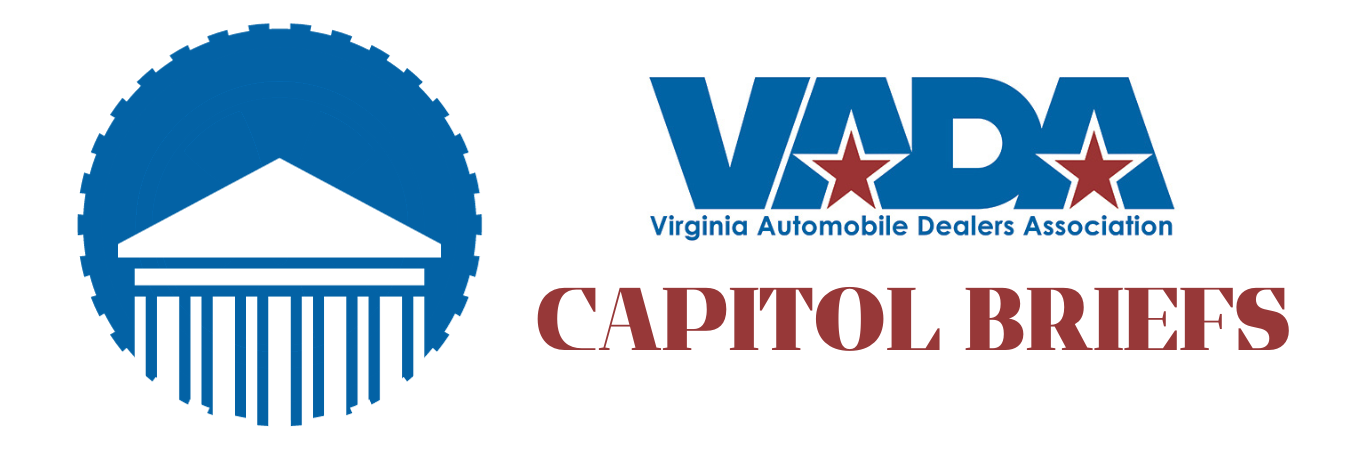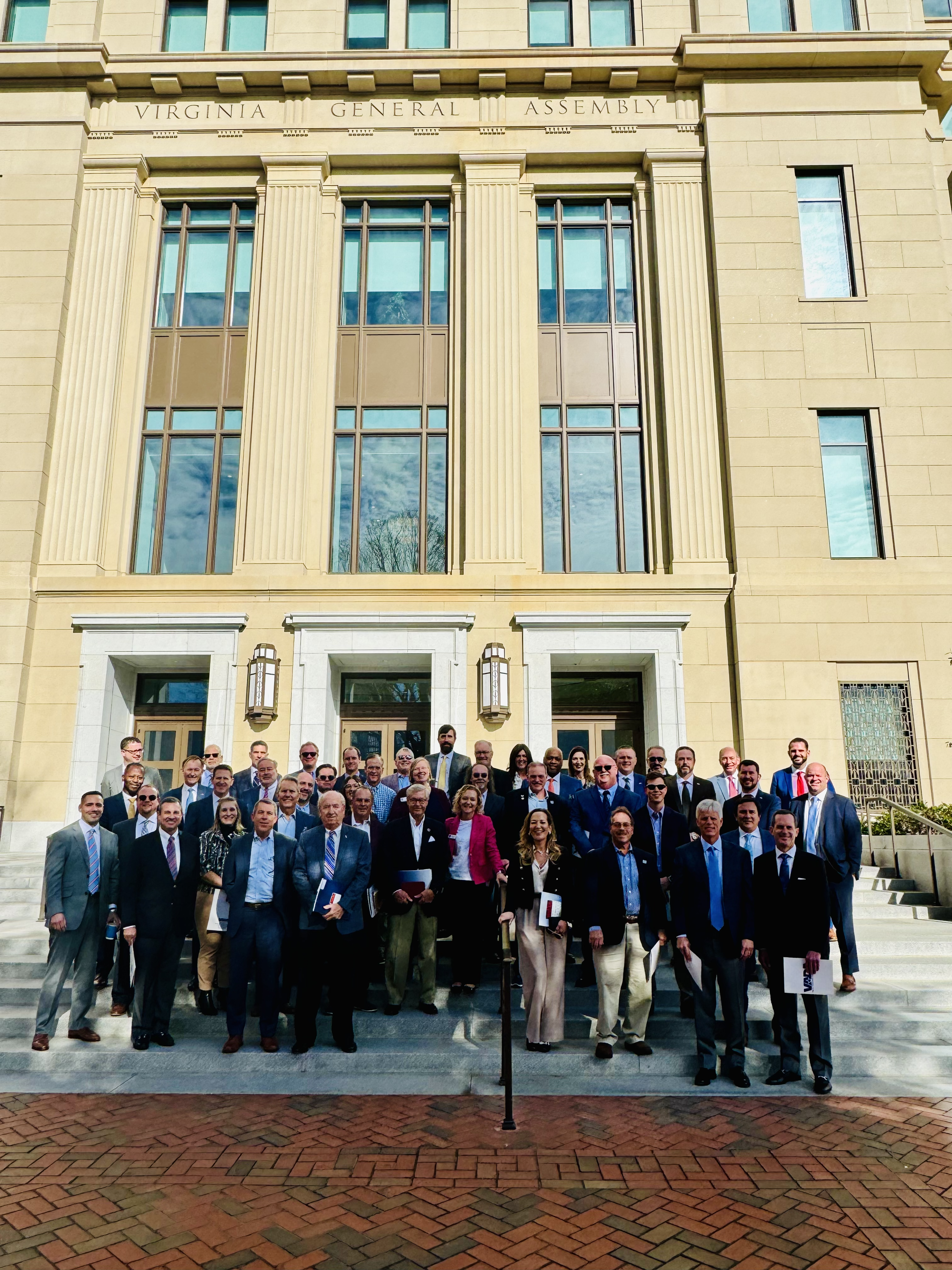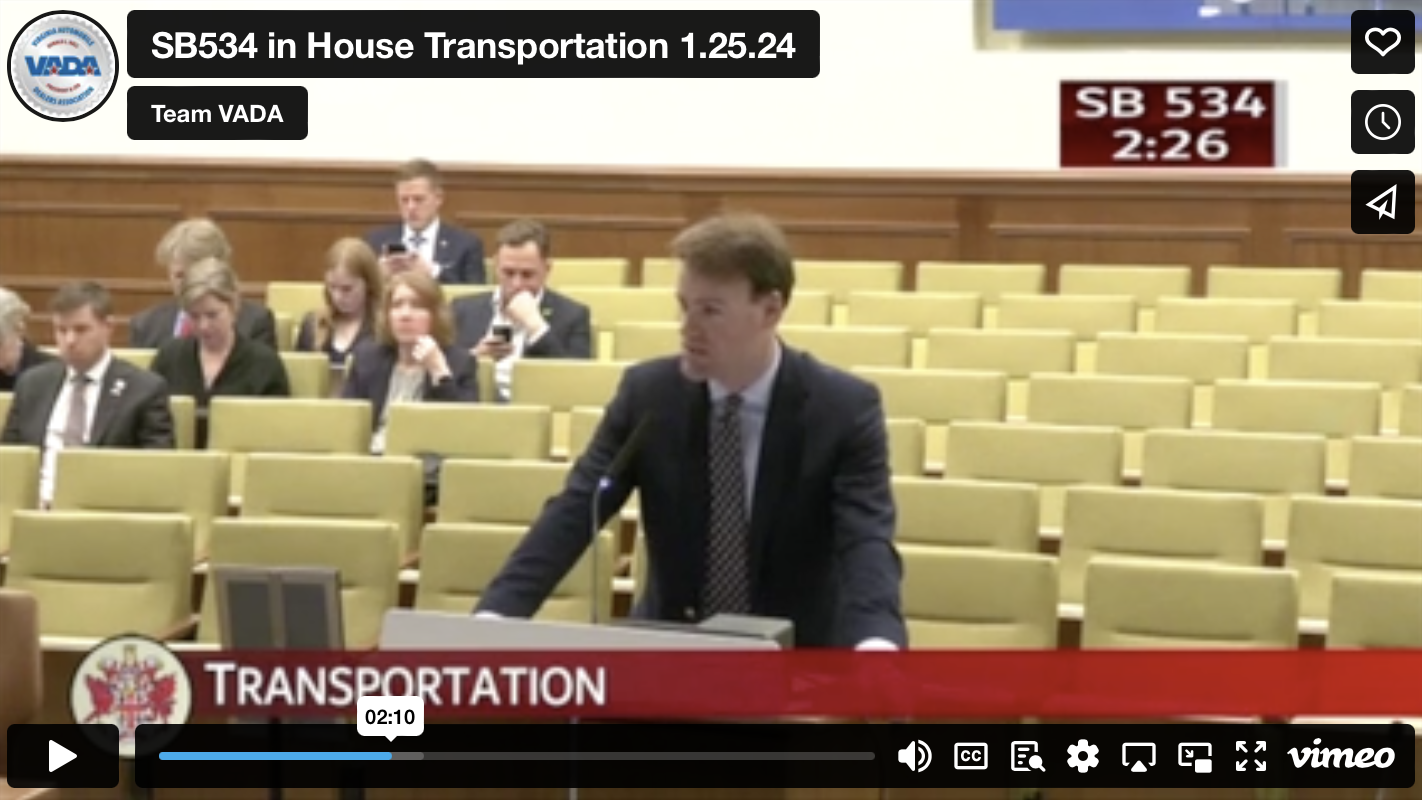
January 26, 2024
Dealer Day in Richmond; Buy/Sell legislation moves forward with unanimous approval

Virginia dealers on the steps of the new Virginia General Assembly Building in Richmond at Dealer Day at the Capitol, held January 24, 2024.
Dealers came to Richmond this week (January 24) for Dealer Day at the Capitol, our first since 2020. At the new General Assembly Building, about 50 dealers met with a number of lawmakers and aides, taking time to both explain the benefits of the franchise system while also advocating for VADA’s legislation to create more predictability and objectivity in the dealership buy/sell process.
VADA Vice President of Legislative Affairs Ralston King testified on Thursday at a meeting of the Senate Transportation Committee in support of the Senate version of the buy/sell bill, SB 534, carried by Sen. Lamont Bagby (D-14th/Henrico). The legislation passed unanimously out of committee, 15-0.
The bill would:
- Make dealership buy/sells more predictable, giving OEMs 60 days to object to a sale upon notification of a transaction and ending what can often become a lengthy transactional process by eliminating any misunderstanding around time limits. The bill requires dealers to include only specific, identified information about the sale. This notice starts the 60-day clock for approval. By specifying what the notice must include, OEMs will not be able to delay by claiming they still need more information about the sale.
- Make the process more objective, limiting review of a proposed buyer’s experience as an objective measure of their years in the business, as opposed to subjective measures a manufacturer may attempt to use improperly.
We will continue to look at addressing accountability measures for OEMs in the future should we violations of the statute in place for buy/sells. More details on the legislation is below.
The House version of the bill, carried by Delegate Terry Austin (R-37th/Botetourt) will be heard in a Department of Motor Vehicles subcommittee on Tuesday. We expect a similar outcome, but we continue to meet with committee members and make sure they are aware of not only conversations and negotiations with manufacturers, but our overall intent and goal for the legislation.
Here’s a look at the bills we are tracking. For more details on the legislation and their current status in the process, click the bill number.
Buy/sell legislation to create Predictability and Objectivity: HB 191 (Austin) and SB 534 (Bagby)
Our priority legislation will help entrepreneurial dealers buy and sell their businesses in a more straightforward manner. Virginia’s existing statute was intended to create more predictable and objective dealership transaction approvals. Manufacturers often delay or oppose dealership sales due to a lack of clarity in the existing statute.
 Our proposed changes in Virginia’s buy/sell laws aim to streamline and make the sale approval process more predictable and objective — with several changes.
Our proposed changes in Virginia’s buy/sell laws aim to streamline and make the sale approval process more predictable and objective — with several changes.
- Timeframe clarity: OEMs would have 60 days to object to a sale upon notification of a transaction, ending what can often become a lengthy transactional process by eliminating any misunderstanding around time limits.
- Clarification of Sufficient Notice: The buy/sell notice from the dealer to the OEM would include only specific, identified information about the sale. This notice starts the 60-day clock for approval. By specifying what the notice must include, OEMs will not be able to delay by claiming they still need more information about the sale.
- Reasonableness definition: Manufacturers may still oppose a sale if the buyer lacks dealership experience. The bill more clearly defines the “reasonableness” of a proposed transferee’s experience as an objective measure of their years in the business, as opposed to subjective measures a manufacturer may attempt to use improperly.
- No delays: If the OEM does not respond within 60 days, the sale is deemed approved.
Safety inspections evolving? SB 349 (Reeves) and HB 1047 (Batten)
VADA is in full support of the state’s safety inspection program. We’re also open to changes.
Two proposals would modify the safety inspection program for new vehicles — in particular, exempting new vehicles from safety inspections for the first two years.
The Senate version, with changes, passed the Senate Transportation committee last week. Collaboration with various stakeholders, including Sen. Bryce Reeves (R-28th/Fredericksburg), led to adjustments that made the bill acceptable to both Virginia auto dealers and state police.
The goal is to maintain the state safety inspection program while providing accommodations for new vehicles that undergo a pre-delivery inspection before sale, and generally have very few wear-and-tear issues checked by an inspection in their initial two years.
Emissions standards stand: SB 3 (Stuart), SB 53 (McDougle), SB 160 (McGuire)
Several bills were introduced attempting to repeal the California Air Resources Board's zero-emission vehicle standards, which passed in 2021 with VADA’s backing. The Republican-sponsored bills were rejected by the Senate Agriculture, Conservation, and Natural Resources committee, where Democrats remain firm in supporting the standards.
Committee Chairman Sen. Dave Marsden (D-35th/Burke) emphasized the need to evaluate Virginia’s Clean Cars and Clean Economy acts, to consider the feasibility of meeting aspirational goals for zero-emission vehicle sales. A workgroup led by Sen. Marsden will assess the trajectory of new zero-emission vehicle sales and the industry's capacity to meet goals.
VADA supports various zero-emission vehicles — battery electric, plug-in hybrid, hybrid, and all the varied powertrains. Most auto manufacturers have made it clear they are committed to phasing out gas-powered engines over the next 15 years.
However, mass adoption of EVs requires government policies that are technologically achievable, maintain affordability, and complement the efforts of the private sector in advancing the vehicle fleet turnover needed to achieve the targeted environmental benefits within a timeframe that helps, not hurts, new vehicle buyers.
We appreciate Sen. Marsden, along with Commerce and Labor Chairman Sen. Creigh Deeds (D-11th/Charlottesville), intend to convene a working group to ensure Virginia’s policies achieve those goals.
A consumer protection bill that will harm consumers and businesses: HB 1320 (McClure) and SB 388 (Pekarsky)
From groceries to TVs to automobiles, these amendments to the Virginia Consumer Protection Act would make it mandatory for any seller of consumer goods to include all fees in the price in all advertising. The “Virginia Consumer Protection Act” would prohibit advertising, displaying, or offering any pricing information for goods or services without prominently displaying the total price, which includes all mandatory fees or charges other than taxes imposed.
Obviously, this bill affects retail automotive dealers who are permitted to charge processing fees, and additional charges and taxes. Unlike most retailers, Virginia dealers are subject to a robust set of laws and regulations related to advertising, including appropriate disclosure of fees and charges. Those rules take into account standard industry practices.
This bill would alter how dealers would advertise. For example, certain fees, like processing fees, that can be disclosed separately now must be lumped in with the vehicle price. This creates a significant disadvantage with dealers in other states that may be able to continue to advertise the same fees separately, making their transaction costs appear lower. It would also create consumer confusion.
